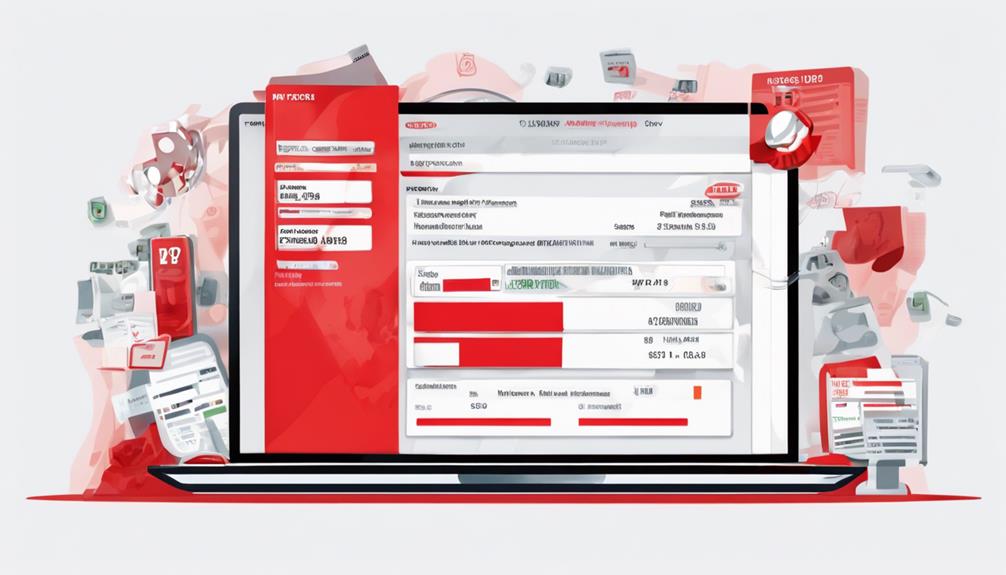E-commerce payment processing is crucial for online transactions, as it entails secure credit card processing through encrypted gateways and adherence to PCI DSS standards for data protection. Payment gateways protect and transmit customer data to processors for transaction verification, with merchant accounts receiving the funds. Knowledge of these elements establishes a secure foundation for transactions. Considerations such as data security tokenization and fee structure variations play a key role in optimizing the payment process. Exploring these aspects further can enhance comprehension of the complexities at hand.
Key Takeaways
- Payment gateways secure online transactions through encryption.
- Payment processors verify and authorize transactions for efficiency.
- Merchant accounts handle fund transfers securely.
- PCI compliance is crucial for safeguarding sensitive payment data.
- Collaboration between gateways, processors, and accounts ensures seamless ecommerce payments.
Ecommerce Payment Processing Overview
In our exploration of Ecommerce Payment Processing Overview, we delve into the intricate mechanisms behind authorizing transactions and securely transmitting credit card information. Ecommerce payment processing services are essential for facilitating credit card transactions online.
A secure payment gateway acts as the bridge between the customer, merchant account, and online payment processor. This gateway encrypts payment information before transmitting it to the processor for authorization. Maintaining Payment Card Industry Data Security Standard (PCI DSS) compliance is crucial to safeguarding sensitive data during these transactions.
Choosing a reliable online payment processor that aligns with PCI compliance standards is a key aspect of ensuring secure transactions. By understanding the role of payment gateways, merchant accounts, and PCI compliance, businesses can establish a robust foundation for processing online payments efficiently and securely.
Essential Components of Payment Processing

Let's break down the essential components of payment processing to understand their roles in facilitating secure online transactions.
In ecommerce payment processing, payment gateways, payment processors, and merchant accounts work together seamlessly. Payment gateways play a crucial role in securing and transmitting customer information to payment processors. These gateways ensure that online transactions are conducted safely by adhering to the Payment Card Industry Data Security Standard.
Payment processors then step in to verify and authorize transactions before transferring funds to merchant accounts. Merchant accounts serve as the destination for processed funds from successful transactions, completing the cycle of electronic payments. This collaborative effort ensures secure and efficient ecommerce payments, safeguarding both businesses and customers.
Understanding how these components interact is vital for maintaining a trusted and reliable online payment system.
How Payment Gateways Work
Payment gateways facilitate the secure transmission of payment information between customers, merchants, and payment processors, ensuring the encryption of sensitive data like credit card details to prevent unauthorized access during online transactions.
Here's how payment gateways work:
- Real-Time Processing: Payment gateways play a crucial role in authorizing payments instantly, ensuring swift transactions for ecommerce businesses.
- Seamless Transactions: Acting as a bridge between the customer's chosen payment method and the payment processor, payment gateways guarantee smooth and uninterrupted transactions.
- Preventing Fraud: By verifying the authenticity of transactions, payment gateways help prevent fraudulent activities, creating a secure payment environment for all parties involved.
- Verifying Transactions: Payment gateways verify transactions to confirm the validity of the payment, adding an extra layer of security to online transactions.
Understanding how payment gateways operate is essential for ensuring secure and efficient online transactions.
Role of Payment Processors

Our collaboration with payment processors ensures the secure and efficient verification of online transactions, safeguarding the integrity of the payment process for our ecommerce operations. Payment processors play a vital role in the seamless processing of payments in the online realm. They work closely with payment gateways and merchant accounts to validate and authorize transactions, ensuring that customer credit card or debit card information is valid before transferring funds to the merchant account. By partnering with trusted payment service providers, we prioritize security and reliability in every transaction, enhancing the trust between our ecommerce business and our customers. The table below provides a clear overview of the key elements involved in the role of payment processors:
| Role of Payment Processors |
|---|
| Verify online transactions |
| Authorize payment information |
| Ensure security of payments |
Function of Merchant Accounts
Facilitating secure fund transfers between payment processors and merchants, merchant accounts play a pivotal role in the efficient processing of online transactions. These accounts act as a bridge between the payment processor and the merchant, ensuring timely fund deposits and access to funds from ecommerce transactions.
Here are four key functions of merchant accounts:
- Secure Payment Processing: Merchant accounts are essential for securely managing and processing online payments, safeguarding sensitive financial information.
- Fee Reduction: By utilizing merchant accounts, businesses can reduce fees associated with payment processing, ultimately saving on transaction costs.
- Timely Fund Deposits: Ensuring that merchants receive their funds promptly, merchant accounts play a crucial role in facilitating timely fund deposits.
- Access to Funds: Merchant accounts enable businesses to access the funds generated from ecommerce transactions, providing liquidity for operational needs.
Understanding the functions of merchant accounts is vital for businesses seeking efficient and secure online payment processing.
Payment Processing Workflow

Initiating a transaction on an ecommerce website involves the customer entering their credit or debit card details to kickstart the secure payment processing workflow. When the customer enters their payment information, the encrypted payment details are securely transmitted to the chosen payment processing solution.
The ecommerce payment processors then verify the transaction with the customer's bank to authorize the payment. Once authorization is confirmed, funds are transferred from the customer's account to the merchant's account, completing the transaction. It's crucial to ensure that the credit card information must be handled securely to maintain customer trust.
This seamless workflow guarantees a secure and efficient process for online purchases. In case of any issues, reliable customer support is essential for resolving any payment-related concerns promptly. When choosing an ecommerce credit card processing solution, prioritizing secure transactions and excellent customer support is key to achieving a smooth payment process.
Factors in Choosing a Processor

When selecting a payment processor for ecommerce transactions, it's crucial to consider various factors to ensure a seamless and secure payment process. Here are four key factors to keep in mind:
- Trust and Security Measures: Consider the trustworthiness and security protocols of the processor to instill confidence in customers when making online transactions.
- Fees and Fraud Protection: Evaluate the fees, integration capabilities, and fraud protection features offered by different processors to safeguard both your business and your customers' information.
- Compatibility with Ecommerce Platform: Ensure that the processor integrates smoothly with your ecommerce platform to provide a seamless payment experience for customers.
- Acceptance of Various Payment Methods: Look for processors that accept major credit cards, less common cards, buy-now-pay-later services, mobile payments, and even cryptocurrency to offer flexibility in payment options.
Payment Processing Security Considerations

In ensuring secure payment processing, prioritizing tokenization and SSL certificates is fundamental for safeguarding sensitive payment information. Tokenization replaces credit card data with unique tokens, reducing the risk of data breaches.
SSL certificates encrypt data during transmission, ensuring secure payment transactions. Maintaining PCI compliance standards is crucial to handle credit card information securely and adhere to industry regulations.
Payment processors employ advanced security protocols like encryption to protect user payment details. Robust security measures, including fraud detection and prevention, are essential components of secure payment processing systems.
Types of Accepted Payments

To ensure a seamless payment experience for customers, understanding the various types of accepted payments is essential in the realm of ecommerce. Here are some key payment methods widely used in online transactions:
- Credit and Debit Cards: Popular choices like Visa, Mastercard, and American Express are widely accepted, providing a convenient way for customers to make purchases online.
- Digital Wallets: Services such as PayPal, Apple Pay, Google Pay, and Amazon Pay offer secure and efficient payment options, allowing users to store their payment information for quick transactions.
- Buy Now, Pay Later: Services like Affirm, Afterpay, Klarna, and Sezzle are gaining popularity for offering flexible payment plans that allow customers to spread out their purchase payments over time.
- Bank Transfers: Particularly common in high-value B2B transactions, bank transfers provide a direct and secure method for transferring funds between businesses.
Tokenization Importance

Tokenization is crucial for bolstering security measures in online transactions, safeguarding customer data from potential breaches.
By replacing sensitive information with unique tokens, businesses can ensure a seamless payment experience while minimizing risks.
This practice not only protects card details but also builds trust with customers, making it a vital component of secure payment processing.
Enhanced Security Measures
Enhancing payment security through tokenization is crucial in safeguarding sensitive customer information during online transactions.
- Tokenization replaces payment details with unique tokens, reducing the risk of data breaches.
- Customer credit card information isn't stored in the merchant's system, adding an extra layer of security.
- Simplifies the checkout process for faster transactions without compromising security.
- Widely used in ecommerce to protect payment data during online transactions and comply with PCI DSS standards, building trust with customers concerned about data security.
Seamless Payment Experience
How can tokenization revolutionize the way customers experience online payments with enhanced security measures? Tokenization replaces sensitive payment information with unique tokens, minimizing the risk of data breaches and ensuring secure ecommerce transactions. By storing encrypted payment data, this technology enables faster checkout processes while protecting customer trust. Implementing tokenization also helps businesses comply with PCI standards, safeguarding against fraudulent activities. The table below highlights the benefits of tokenization for a seamless payment experience:
| Benefits of Tokenization | ||
|---|---|---|
| Enhanced Security | Faster Checkout | Customer Trust |
| Reduces Data Breaches | Stores Encrypted Data | PCI Compliance |
Fee Structure Comparison

When comparing fee structures for ecom payment processing, it's important to carefully analyze the costs associated with different payment processors. To help you make an informed decision, here are some key points to consider:
- Flat Rate: Payment processors like Stripe often charge a flat rate of approximately 2.9% + 30 cents per transaction.
- Volume Discounts: Some processors may offer lower rates or volume discounts for high-volume businesses.
- Additional Fees: Be aware of other fees such as chargeback fees, international transaction fees, and monthly subscription fees that can impact your overall costs.
- Cost-Effective Analysis: Comparing fee structures is crucial in determining the most cost-effective option for your business, ultimately affecting profitability.
Understanding these aspects of the fee structure can help optimize your payment processing costs and enhance the financial performance of your e-commerce business. By carefully evaluating these factors, you can choose a payment processor that aligns with your budget and business goals effectively.
Frequently Asked Questions
How Does Payment Processing Work in Ecommerce?
In ecommerce, payment processing works when customers enter payment details on a website. The information encrypts, sends to the processor for authorization, and verifies with the bank. Once approved, funds transfer to the merchant's account.
What Is the Payment System of E Commerce?
Like a well-oiled machine, the payment system of e-commerce seamlessly connects customers and merchants, ensuring secure transactions. We verify payments, transfer funds, and comply with PCI DSS standards for safe online shopping experiences.
What Is the Process Involved With Processing an E Commerce Transaction?
We securely transmit payment details to the processor, verify the transaction with the bank, and transfer funds upon authorization. Our process ensures efficiency and security through encryption and verification layers for seamless ecommerce transactions.
What Are the Basics of Payment Processing?
Navigating the basics of payment processing is akin to mastering the art of a seamless dance. We authorize, transmit, and ensure funds flow securely, all to empower merchants. It's a synchronized symphony, orchestrating successful transactions.
Can Green Payment Processing Methods Be Applied to Ecommerce Transactions?
Yes, green payment options available can be applied to ecommerce transactions. By utilizing digital wallets, mobile payments, and blockchain technology, ecommerce businesses can reduce their carbon footprint and support sustainable methods of payment. Implementing eco-friendly payment processing methods demonstrates a commitment to environmental responsibility.
Conclusion
In conclusion, understanding ecom payment processing is crucial for the success of online businesses. From payment gateways to merchant accounts, each component plays a vital role in ensuring secure and efficient transactions.
By considering security measures, accepted payment types, and fee structures, businesses can optimize their payment processing system. Remember, in the world of e-commerce, staying informed and adapting to new technologies is key to staying ahead of the competition.









